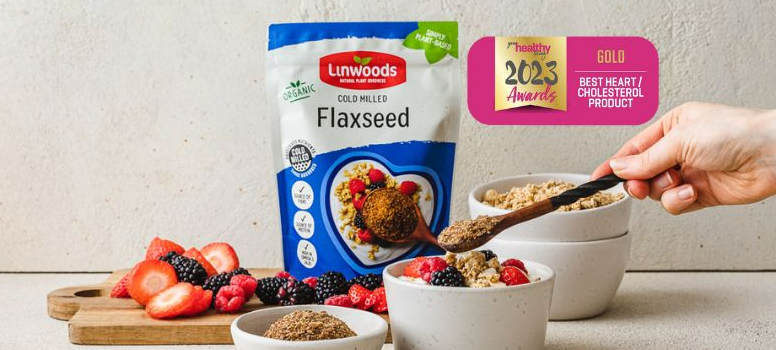Flaxseeds: A natural solution for menopausal symptoms, by Jane McClenaghan and this InTouch blog is facilitated by Flaxseed producers linwoodshealthfoods.com
News from Linwoods Health Foods
Flaxseeds: A natural solution for menopausal symptoms
Are flaxseeds a natural solution for menopausal symptoms? In this article, Jane McClenaghan, a highly respected nutritionist with over 20 years of experience, shares her expert insights on how flaxseeds can support women’s health, particularly during menopause. Known for their rich lignan content, flaxseeds have been shown to help regulate hormones, support heart health, improve skin condition, and even reduce common menopause symptoms like hot flushes and night sweats. Jane explores the science behind flaxseeds’ many benefits and provides practical tips for incorporating them into your daily routine for optimal health.
WHAT ARE LIGNANS IN FLAXSEEDS?
Flaxseed is the richest source of lignans in our diet. These are naturally occurring plant chemicals that are predominantly found in the husk of flaxseeds ref.
Lignans have been shown to have anti-inflammatory, antioxidant and phytoestrogen, or hormone balancing, effects.
When lignans reach our digestive tract, bacteria in our gut microbiome get to work on them to form by-products called enterodiol and enterolactone. These metabolites have a similar structure to oestrogen, so they can bind to oestrogen receptors in the body and exert a gentle modulating effect on female hormones.
Milled flaxseed is a great way to eat your daily flax, because lignans are found in the outer husk of flaxseed. Linwoods Menoligna has been specially to provide optimal levels of lignans for women at perimenopause.
HOW CAN FLAXSEEDS SUPPORT WOMEN AT MENOPAUSE?
Changing our diet at perimenopause can make a big difference to symptoms, and our long-term health, and flaxseeds are an important part of the menopause nutritional toolkit.
Here are some ways flaxseed may help:
1. REDUCING FATIGUE
Flaxseed is a good source of protein and magnesium, nutrients which may help support energy levels and reduce tiredness and fatigue, respectively.
2. HORMONE REGULATION
Hormone regulation – the lignans in flaxseed may help women manage some symptoms like hot flushes at menopause.
3. SUPPORTING SKIN HEALTH
Skin changes like spots, redness and changes in texture can be caused by increased inflammation. The omega 3 fats found in flaxseed may have a positive effect on skin condition.
4. SUPPORT HEALTHY CHOLESTEROL LEVELS
Heart health – women are at increased risk of cardiovascular disease at menopause. Regular consumption of flaxseed may help support healthy cholesterol levels.
5. REDUCING HOT FLUSHES AND NIGHT SWEATS
Hot flushes and night sweats – a regular, daily intake of flaxseed has been shown to reduce intensity and duration of sweats at menopause
6. WEIGHT MANAGEMENT AND INSULIN SENSITIVITY
Weight gain – as hormones start to change at perimenopause, women can become more insulin resistant, leading to fatigue and weight gain. Adding flaxseed to meals may support healthy weight management
ENJOY FLAXSEED EVERY DAY!
Consistency is key so, building a routine of adding flaxseed into your diet every day is the best way to get the benefits of flaxseeds and lignans.
Flaxseeds are really versatile. You can enjoy them added to your morning smoothie, or overnight oats, or use for baking in breads, crackers and cookies.
Here are some ideas to help you enjoy flaxseed at any time of the day:
WITH BREAKFAST:
* The perfect addition to your favourite smoothie or protein shake
* Stir into porridge or overnight oats
* Add as a topper to yoghurt, fruit and a low sugar granola
AT LUNCHTIME:
* Bake flaxseed into breads, or use to make herby flaxseed crackers
* Mix with other seeds and herbs like oregano and thyme for a tasty soup topper
* Pop on top of salads
AT DINNER:
* Add a spoonful to curry, stew or chilli.
* Bake into flaxseed crackers as an accompaniment to meals
REFERENCES
* https://www.ncbi.nlm.nih.gov/pmc/articles/PMC9778916/
*
https://lpi.oregonstate.edu/mic/dietary-factors/phytochemicals/lignans
* https://pubmed.ncbi.nlm.nih.gov/25882265/
* https://pubmed.ncbi.nlm.nih.gov/34119421/
* https://pubmed.ncbi.nlm.nih.gov/25882265/
* https://www.ncbi.nlm.nih.gov/pmc/articles/PMC9210019/
* https://www.bda.uk.com/resource/menopause-diet.html
————————-
ABOUT THE AUTHOR
Jane McClenaghan is Northern Ireland’s most recognised nutritionist with over 20 year’s experience. Her company Vital Nutrition specialises in developing and delivering group sessions for corporate and community clients both online and in-person as well as running an online membership club and offering one-to-one consultations.
Jane’s knowledge in the subject area of health and wellbeing is unrivalled as indicated by her qualifications, reputation and experience.
Jane’s sessions cover a range of health and wellbeing topics from mental health to stress, female and male health, healthy eating on a budget, heart health, sleep, family wellbeing and much more. Jane is also the author of two books on nutrition, she writes a weekly column in the Irish News, has a monthly slot on radio U105 and is a regular contributor to the BBC, The Belfast Telegraph and many other media outlets.
You can find out more and get in touch with Vital Nutrition here;
Vital Nutrition (vital-nutrition.co.uk)
REFERENCES
* https://www.ncbi.nlm.nih.gov/pmc/articles/PMC9778916/
*
https://lpi.oregonstate.edu/mic/dietary-factors/phytochemicals/lignans
* https://pubmed.ncbi.nlm.nih.gov/25882265/
* https://pubmed.ncbi.nlm.nih.gov/34119421/
* https://pubmed.ncbi.nlm.nih.gov/25882265/
* https://www.ncbi.nlm.nih.gov/pmc/articles/PMC9210019/
* https://www.bda.uk.com/resource/menopause-diet.html









